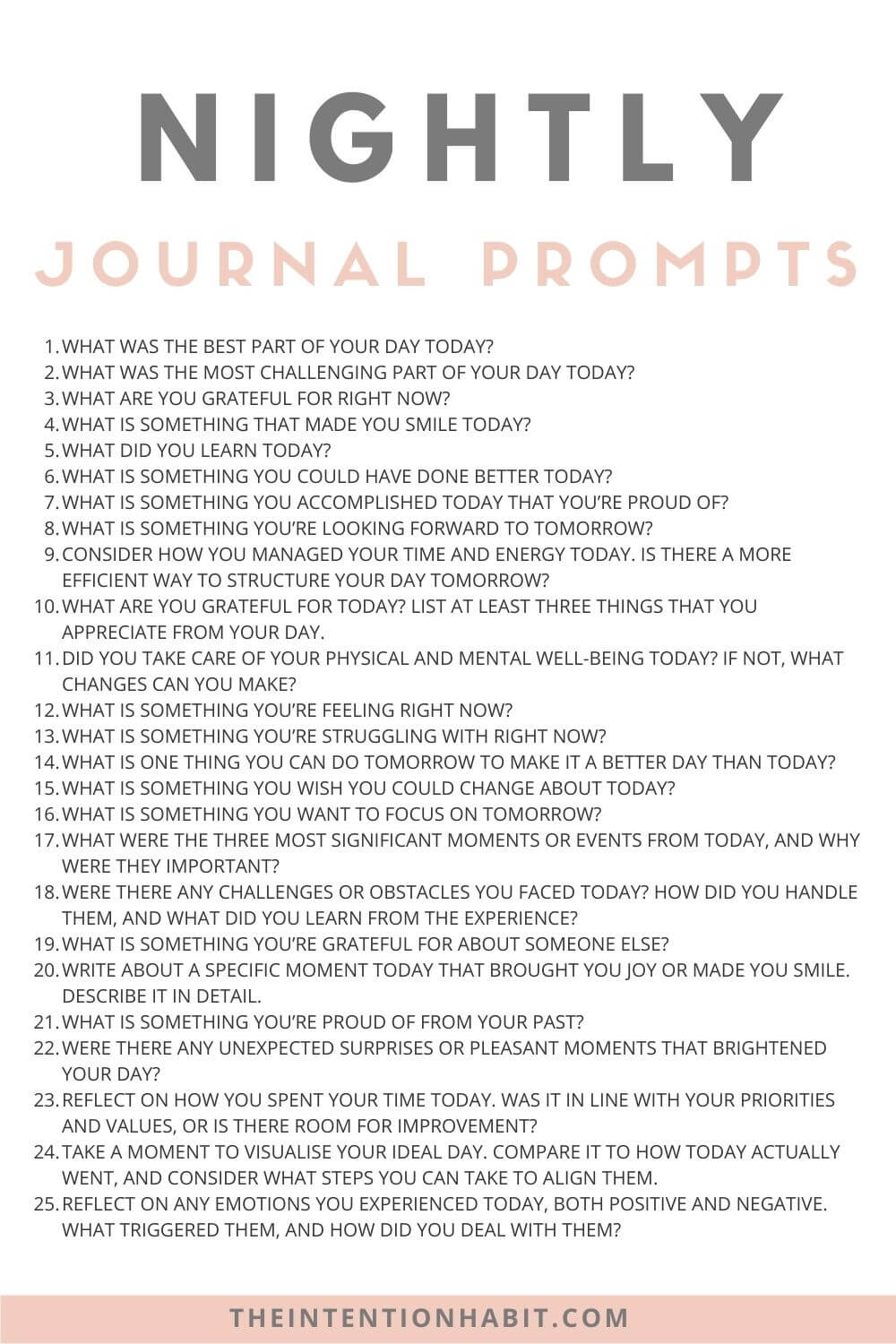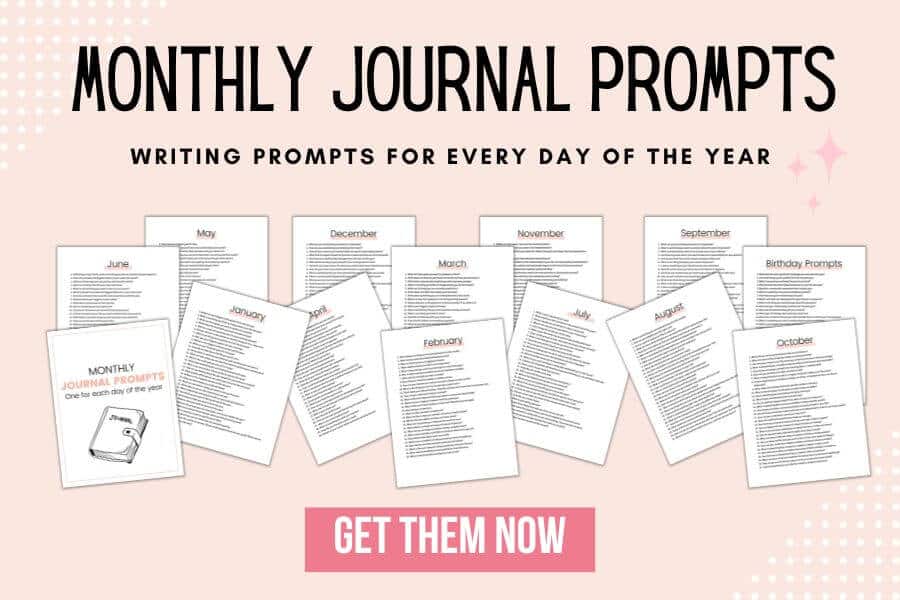25 Nightly Journal Prompts To Reflect Before Bed
These nightly journal prompts are a powerful tool for your nighttime routine to get better sleep, reflect on the day, practice gratitude & reduce stress. Using journal prompts can help you maintain a daily journal habit and there are plenty of other great benefits for bedtime journaling too!
If you are struggling to maintain a journaling routine or finding yourself too busy during the day to reflect on your thoughts and emotions, these night journaling prompts might be exactly what you need!
Let’s dig into why night journaling is beneficial plus I have a list of journal prompts for night time too!
Is It Better To Journal In The Morning Or At Night?
Deciding when to journal is a personal preference, and there is no one-size-fits-all answer to this question.
Some people prefer to journal in the morning, while others prefer to journal at night. Some people mix it up depending on what feels right on the day and others do both.
Morning journaling is a great way to start your day. It can help you clear your mind, set your intentions for the day, and prioritize your tasks.
Journaling before bed is a great way to reflect on your day and unwind before sleep. It can help you process any emotions or events from the day and prepare for a good night’s sleep. Writing down your thoughts and feelings can also help you release any stress or tension you may be holding onto.
While there are benefits to both, journaling at night can be particularly effective for those who struggle with racing thoughts or anxiety before bed.
Another option for nightly journaling is to write down a to-do list for the next day. This is more of a nightly planning session but it can absolutely be incorporated into your night journaling session.
This can help you organise your thoughts and prioritise your tasks for the following day. Writing down your to-do list can also help you clear your mind and reduce any anxiety or stress you may be feeling about the next day.
What Are The Benefits Of Using Nightly Journal Prompts?
Keeping a nightly journal can have numerous benefits for your mental health and overall wellbeing. By using bedtime journal prompts, you can guide your thoughts towards positive thoughts, self-reflection, and how you can have a better tomorrow if you’ve had a bad day.
Here are some of the benefits of using nightly journal prompts:
- Reducing Anxiety And Negative Thoughts: Writing down your thoughts and feelings can help reduce anxiety and negative thoughts and help you identify patterns in your thinking and behaviour, allowing you to make positive changes.
- Improved Sleep: Before bed journaling is a great mindfulness exercise that can help you get a more restful sleep.
- Practising Self-Care: Journaling is a form of self-care. By taking the time to reflect on your day and your emotions, you are showing yourself compassion and care.
- Focusing On The Present Moment: Journaling can help you focus on the present moment. This can help you feel more grounded and centred.
- Identifying Stressors: Journaling can help you identify sources of stress in your life so you can gain a better understanding of what triggers your negative emotions.
- Reducing Judgment: Journaling can help reduce judgment towards yourself and others to allow you to develop stronger relationships and a more positive outlook on life.
25 Night Journal Prompts To Reflect Before Bed
Taking just a few minutes before bed to reflect on your day and write down your thoughts can help calm your mind and prepare you for a restful night’s sleep. Used alongside positive affirmations makes this practice even more powerful!
Using nighttime journal prompts can help us practice gratitude, review our day and experiences and create a relaxing evening routine.
Here are 25 reflective night journal prompts to get you started:
- What was the best part of your day today?
- What was the most challenging part of your day today?
- What are you grateful for right now?
- What is something that made you smile today?
- What did you learn today?
- What is something you could have done better today?
- What is something you accomplished today that you’re proud of?
- What is something you’re looking forward to tomorrow?
- Consider how you managed your time and energy today. Is there a more efficient way to structure your day tomorrow?
- What are you grateful for today? List at least three things that you appreciate from your day.
- Did you take care of your physical and mental well-being today? If not, what changes can you make?
- What is something you’re feeling right now?
- What is something you’re struggling with right now?
- What is one thing you can do tomorrow to make it a better day than today?
- What is something you wish you could change about today?
- What is something you want to focus on tomorrow?
- What were the three most significant moments or events from today, and why were they important?
- Were there any challenges or obstacles you faced today? How did you handle them, and what did you learn from the experience?
- What is something you’re grateful for about someone else?
- Write about a specific moment today that brought you joy or made you smile. Describe it in detail.
- What is something you’re proud of from your past?
- Were there any unexpected surprises or pleasant moments that brightened your day?
- Reflect on how you spent your time today. Was it in line with your priorities and values, or is there room for improvement?
- Take a moment to visualise your ideal day. Compare it to how today actually went, and consider what steps you can take to align them.
- Reflect on any emotions you experienced today, both positive and negative. What triggered them, and how did you deal with them?
These prompts are just a starting point. Feel free to modify them to fit your own needs or come up with your own prompts that resonate with you. The important thing is to make journaling a habit and a regular part of your nightly routine.

Tips For Maintaining a Journal Routine
Starting an evening journaling practice can be daunting, but once you establish a routine, it can become a comforting and rewarding habit. Even better is the fact that it can lead to a better night’s sleep and reduced stress!
Here are some tips to help you maintain a journaling routine:
1. Set a Routine
Choose a consistent time and place to journal. Setting a routine will help you develop a habit and make journaling part of your daily routine. Your routine might include journalling at the same time of the day each night, such as after you brush your teeth at night or as you climb into bed.
2. Start Small
If you’re new to journaling, start small. Commit to writing for just five minutes a day and gradually increase the time as you become more comfortable. This will help you avoid feeling overwhelmed and make it easier to establish a journaling practice. And sometimes, you only need 5 minutes rather than 10-15 minutes anyway.
3. Step Out of Your Comfort Zone
Don’t be afraid to explore new topics and ways of expressing yourself. Drawing, bullet journalling, a gratitude list, as a few examples. Trying new things can help you grow as a person and develop your writing skills. If you’re stuck, using these prompts ideas will help you get writing.
4. Wind Down
Using night writing prompts can be a great way to wind down after a long day and improve your chances of peaceful sleep. Use your journal to reflect on your day, process your emotions, and let go of any stress or worries. This can help you relax and improve your sleep quality.
Conclusion: Night Time Journal Prompts
Evening journaling can be a powerful tool for stress relief and creating good habits for personal growth and self-care. Remember that journaling is a personal practice, and there’s no right or wrong way to do it. Focus on the benefits of journaling, such as improved self-awareness, reduced stress, and enhanced creativity. Enjoy the process and allow yourself to grow and develop through your journaling practice.
Find more resources for journaling:
- Birthday journal prompts
- January journal prompts
- February journal prompts
- March journal prompts
- April journal prompts
- May journal prompts
- June journal prompts
- July journal prompts
- August journal prompts
- September journal prompts
- October journal prompts
- November journal prompts
- December journal prompts
- Self-love journal prompts
- Intentional journal prompts
- How to journal with intention









